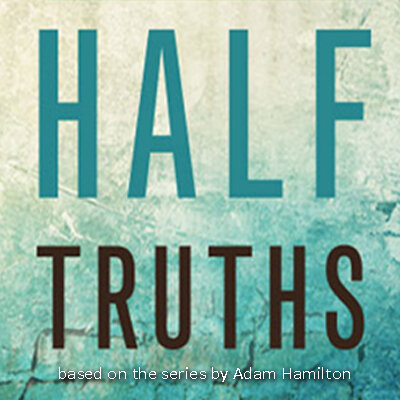¿ Love the Sinner, Hate the Sin ?
Half-Truths - Part 5
(based on the book by Adam Hamilton)
August 3, 2025
with special guest preacher: Rev. McKenzie Sefa
Matthew 7:1-5, Matthew 9:9-13
see also: Romans 14:4-13, Acts 11:2-18
Don’t judge, so that you won’t be judged. You’ll receive the same judgment you give. Whatever you deal out will be dealt out to you. Why do you see the splinter that’s in your brother’s or sister’s eye, but don’t notice the log in your own eye?
Matthew 7:1-3
_______________
Of all the “half-truths” or statements of “Bumper Sticker Christianity” we have talked about, this one feels the most right.
God hates sin. God loves sinners. So why shouldn’t we do the same?
Unfortunately it’s a bit more complicated than that.
Let’s take the statement apart piece by piece.
1. Hate the Sin.
Yes, of course we must hate sin… all sin. Sin breaks God’s heart and leads to destruction. Sin causes harm to ourselves and to others. There is nothing good about sin. The problem is that we rarely use this statement as a declaration against the sin in our own lives. Paul writes that we have all sinned and fallen short of God’s glory (Romans 3:23) and countless scriptures warn us about judging others because we cannot see clearly with the log of sin in our own eye (Matthew 7:4-5).
Generally this is a statement we use to justify our judgment of people who “sin differently than we do.” We will not say we “hate the sin” of the gluttonous person who eats four desserts at a church potluck, but we are quick to “hate the sin” of the homosexual teenager who never comes to church anymore because everybody glares at him with holier-than-thou stares, which we see as perfectly justified.
Yes, we should hate sin, but we must always begin with our own. Do we truly hate the sinful attitudes and behaviors and habits in our own lives? Do we hate the times we sleep in when we don’t feel like going to church? Do we hate the countless excuses we use for avoiding Bible study or times of prayer? Do we hate the ways we avoid difficult conversations about God with people who need to hear the Good News of the gospel? Do we hate the lustful thoughts that pop in our minds out of nowhere? Do we hate the anger and resentment that fills our heart toward that person we just can’t forgive because “they hurt us so deeply?”
Until we hate the sin in our own hearts enough to repent and change, we have no business calling out the sin in others who sin in ways that may not be a temptation for us.
2. Love the Sinner
The problem here is that it is not our place to decide who is a “sinner” and who is not. As we’ve already seen, we are all sinners. At best, this statement is simply redundant. Love the sinner = love everyone because everyone is a sinner. Why not simply say it the way Jesus said it… Love your neighbor (the fact that they are a sinner is irrelevant to the way we are called to love them). When we say “sinner”, we usually have a specific person or specific characteristic in mind. If we are all “sinners,” we have no business singling out people who struggle with specific types of sin.
Secondly, Jesus never actually called anyone a “sinner.” He called people to repent of their sins, and the sins that most angered him were the sins of the religious crowd who should have known better. But remember, it was the Pharisees and Sadducee's who condemned him for “eating with tax collectors and sinners.” Jesus simply saw them as people who God loved that happened to be caught up in sin. He offered them forgiveness and a fresh start. He loved them even before they “repented” or cleaned up their act. He loved them even when they walked away and refused to repent. Their sin did not have any impact whatsoever on his love for them.
Likewise, someone else’s sin should not be a factor in how we treat them and how we love them.
There is really only one part of this statement that needs to be said.
LOVE.
Period.
Nothing else matters. We are all sinners and we are all loved by God.
While we were still weak, at the right moment, Christ died for ungodly people. It isn’t often that someone will die for a righteous person, though maybe someone might dare to die for a good person. But God shows his love for us, because while we were still sinners Christ died for us.
Romans 5:6-8
Stop worrying about whether you think somebody is a “sinner”. Just love.



